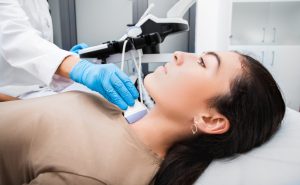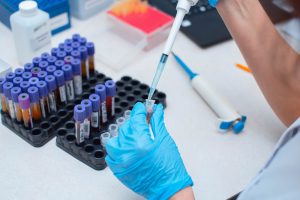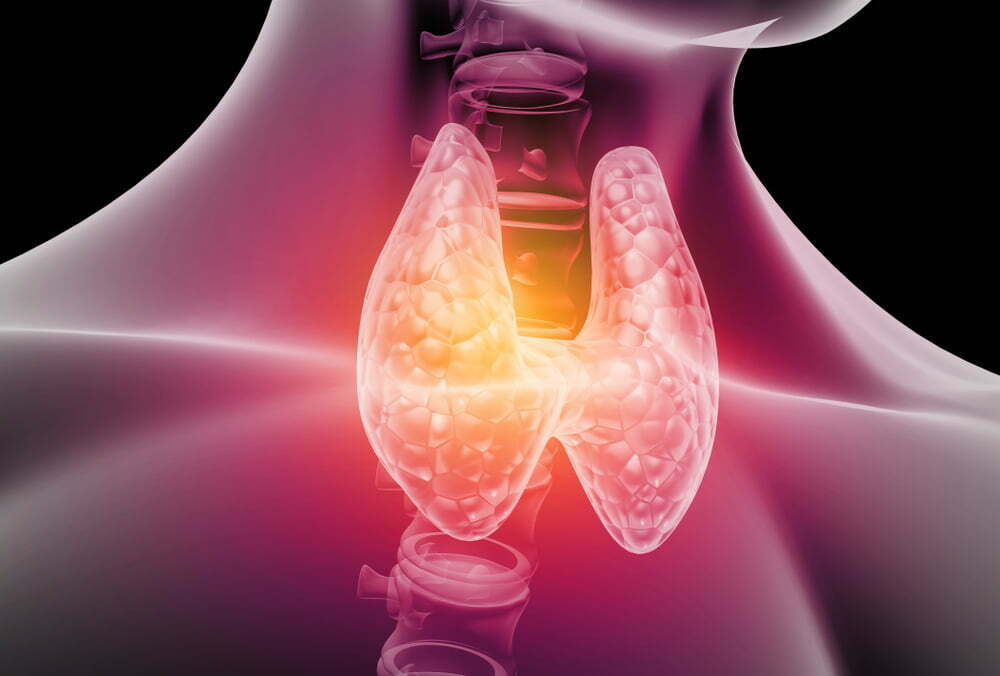Unfortunately, thyroid disease has become, and is now, very common in the United States of America. According to the Cleveland Clinic, “Thyroid disease is very common, with an estimated 20 million people in the Unites States having some type of thyroid disorder. A woman is about five to eight times more likely to be diagnosed with a thyroid condition than a man.”
The thyroid gland, while small, is huge when it comes to its significance in regulating the body’s metabolism. It is a butterfly-shaped gland at the base of the neck that has an impact on all the systems of the body. Maintaining healthy thyroid function is essential to wellness and vitality.
When should thyroid levels be checked?
 If you are experiencing any of the following symptoms, it may be time to get your thyroid checked out. Be warned, most conventional medical offices do not do full thyroid panels (see below for more).
If you are experiencing any of the following symptoms, it may be time to get your thyroid checked out. Be warned, most conventional medical offices do not do full thyroid panels (see below for more).
Symptoms of Hypothyroid:
• Feeling tired / fatigue
• Weight gain
• Foggy brain / forgetfulness
• More frequent and heavy menstrual periods
• Overly dry or course hair
• Dry or hoarse voice
• Intolerance to cooler temperatures
Symptoms of Hyperthyroid:
•Irritability, nervousness, anxiety
• Sleep issues
• Weight loss
• Enlarged thyroid gland or goiter
• Muscle weakness or tremors
• Irregular menstrual periods or halted menstrual cycle
• Heat sensitivity
• Eye irritation or vision challenges
What tests are done to check thyroid?
 Sadly, there are big differences in Conventional Medicine VS Functional Medicine when it comes to testing. A thyroid panel at a functional medicine office includes TSH, T4, T3, Free T4, Free T3, RT3 and TPO antibodies. A thyroid panel at a conventional medicine office generally only includes TSH and T4. At Elite Personalized Medicine we do a full thyroid panel to ensure we get the entire picture to assist our patients in moving towards wellness.
Sadly, there are big differences in Conventional Medicine VS Functional Medicine when it comes to testing. A thyroid panel at a functional medicine office includes TSH, T4, T3, Free T4, Free T3, RT3 and TPO antibodies. A thyroid panel at a conventional medicine office generally only includes TSH and T4. At Elite Personalized Medicine we do a full thyroid panel to ensure we get the entire picture to assist our patients in moving towards wellness.
Full thyroid panel blood tests include:
• Thyroid-stimulating hormone (TSH). The pituitary gland produces thyroid-stimulating hormone (TSH) in the brain. The main role of TSH is to regulate the amount of thyroid hormones—thyroxine (T4) and triiodothyronine (T3)—produced by the thyroid gland. This blood test measures how much overall thyroid-stimulating hormone is in your blood. While this is the standard test most conventional doctors utilize, it simply is not enough detail to understand thyroid activity. As an example, it won’t show you if your body can even use the thyroid hormone being produced.
• T4: thyroxine. Produced by the thyroid and is tested to determine hypothyroidism and hyperthyroidism and used to monitor treatment of thyroid disorders. Low T4 is seen with hypothyroidism, whereas high T4 levels may indicate hyperthyroidism.
 • FT4: Free T4 or free thyroxin. The thyroid gland produces two hormones: thyroxine (T4) and triiodothyronine (T3). T4 is primarily inactive. Its main role is to transport T3 to the proper organs in your body. T4 needs to be converted to T3 before it can be used by the body to get energy or deliver oxygen to cells. The Free T4 test helps determine the level of thyroid hormone in the body; however, it alone does not provide the entire picture as it can be affected by varying amounts of protein in the bloodstream.
• FT4: Free T4 or free thyroxin. The thyroid gland produces two hormones: thyroxine (T4) and triiodothyronine (T3). T4 is primarily inactive. Its main role is to transport T3 to the proper organs in your body. T4 needs to be converted to T3 before it can be used by the body to get energy or deliver oxygen to cells. The Free T4 test helps determine the level of thyroid hormone in the body; however, it alone does not provide the entire picture as it can be affected by varying amounts of protein in the bloodstream.
• T3: triiodothyronine. Produced by the thyroid and is tested to determine hyperthyroidism or to show the severity of hyperthyroidism. Low T3 levels can be observed in hypothyroidism, but more often this test is useful in the diagnosis and management of hyperthyroidism, where T3 levels are elevated.
 • FT3: Free T3 or free triiodothyronine. Triiodothyronine (T3) is the active version of the thyroid hormone. Thyroxine (T4) is converted into triiodothyronine (T3) to become usable; 60% or more of this conversion happens in the liver. T3 circulates in the bloodstream, both bound and not bound to protein. The free (unbound) T3 is what can enter and affect the body tissues. A total T3 test measures all the T3 in your body, even that which is unusable because it isn’t bound to a protein. A free T3 a crucial test because it only measures the amount of free (unbound) T3 in your blood.
• FT3: Free T3 or free triiodothyronine. Triiodothyronine (T3) is the active version of the thyroid hormone. Thyroxine (T4) is converted into triiodothyronine (T3) to become usable; 60% or more of this conversion happens in the liver. T3 circulates in the bloodstream, both bound and not bound to protein. The free (unbound) T3 is what can enter and affect the body tissues. A total T3 test measures all the T3 in your body, even that which is unusable because it isn’t bound to a protein. A free T3 a crucial test because it only measures the amount of free (unbound) T3 in your blood.
• Thyroid antibodies. Testing for thyroid peroxidase (TPO) measures the levels of TPO antibodies in your blood. If you have high TPO levels, it may indicate Hashimoto’s Thyroiditis. Hashimoto’s is an autoimmune condition in which your immune system attacks your thyroid as if it’s a foreign invader. It’s essential to include TPO antibodies in a complete thyroid test because you could have high TPO levels but still show normal TSH. Hashimoto’s is the most common cause of hypothyroidism in the United States, and early detection may help slow its progression.
If you are interested in learning more about your thyroid, consider speaking with one of our physicians at Elite Personalized Medicine, please contact us and we will be happy to schedule a consult for you.








